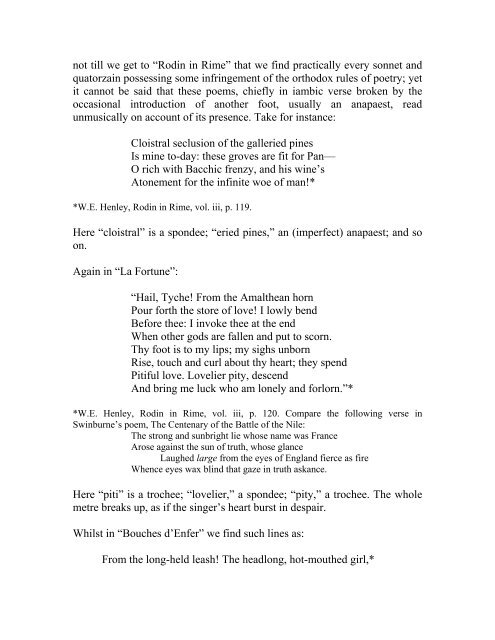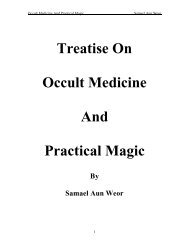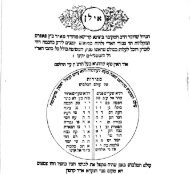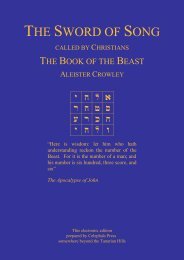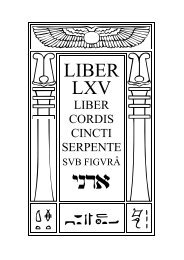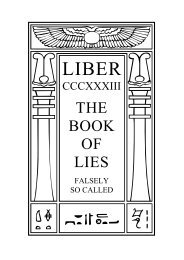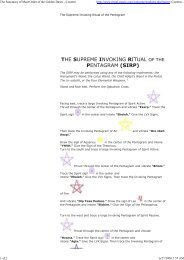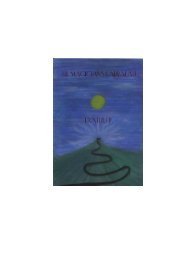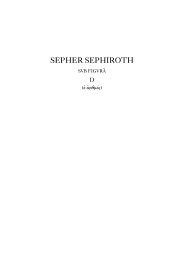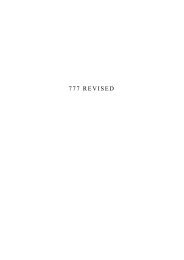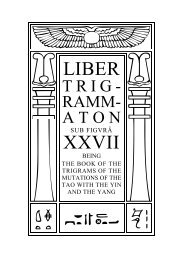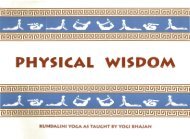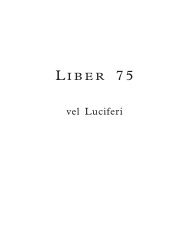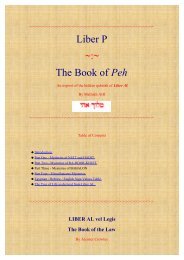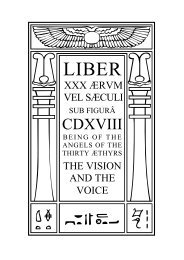- Page 2 and 3: Star in the West A Critical Essay U
- Page 4 and 5: “Evoe! Evoe Ho! Iacche! Iacche!
- Page 6 and 7: PREFACE Non mihi subtilem calamum s
- Page 8 and 9: I have attempted in the following s
- Page 10 and 11: FOREWORD IN “Frazer’s Magazine
- Page 12 and 13: the distant boom of a beetle is car
- Page 14 and 15: I The Chapter known as The Looking-
- Page 16 and 17: Poe, in that little masterpiece of
- Page 18 and 19: Richard Burton, the greatest of Ori
- Page 20 and 21: These superb lines, like those of S
- Page 22 and 23: And lily garment that from sight Ha
- Page 24 and 25: That I bade workers work, and lover
- Page 26 and 27: *Jephthah, vol. i, p. 67. Ha! The r
- Page 28 and 29: All, all to me!* *Why Jesus Wept, v
- Page 30 and 31: that a certain system of irregulari
- Page 34 and 35: The extra half-step in “shudderin
- Page 36 and 37: Where larkspur and cornflower Are b
- Page 38 and 39: *Gargoyles, vol. iii, p. 100. And d
- Page 40 and 41: *Orpheus, vol. iii, pp. 200. O boun
- Page 42 and 43: II The Chapter known as The Virgin
- Page 44 and 45: Fatal Force,” “The Mother’s T
- Page 46 and 47: I think we should principally read
- Page 48 and 49: To the vineyard comes the shower, N
- Page 50 and 51: The handmaidens of Aphrodite gather
- Page 52 and 53: His drowning body drowned her image
- Page 54 and 55: Palaces star-gilt Whence a crystal
- Page 56 and 57: and that the minority should consid
- Page 58 and 59: Even love is sold, the solace of al
- Page 60 and 61: One night I stepped up tremulous on
- Page 62 and 63: *Star and Garter, vol. iii, p. 13.
- Page 64 and 65: Truly the poet has here refined the
- Page 66 and 67: “Alice, an Adultery.” As golden
- Page 68 and 69: In every cosmic season-tide of spri
- Page 70 and 71: . . . . . . . . . . . . . This nigh
- Page 72 and 73: out smiles, and blushing cheeks dry
- Page 74 and 75: circle of the fiery ring,” which,
- Page 76 and 77: after time proved themselves better
- Page 78 and 79: Philotis. I’ faith, Syra, you can
- Page 80 and 81: Lust after death; love in decrepitu
- Page 82 and 83:
On the Quest he goes, ever tormente
- Page 84 and 85:
Thus does he fail at the very thres
- Page 86 and 87:
*Tannhäuser, vol. i, p. 227. Then
- Page 88 and 89:
of the celestial. Love changes as D
- Page 90 and 91:
Act IV again brings our knight befo
- Page 92 and 93:
Built of essential time. And lo! th
- Page 94 and 95:
III The Chapter known as The Harlot
- Page 96 and 97:
probably prove as efficacious as a
- Page 98 and 99:
Imagination’s waistcoat buttons u
- Page 100 and 101:
Cora Vavasour made a pretty just es
- Page 102 and 103:
uttering them over the ruins of the
- Page 104 and 105:
in all the knowledge of the cities
- Page 106 and 107:
The Mother OUT of the countless tho
- Page 108 and 109:
Fallen and loose the shaken tresses
- Page 110 and 111:
*Oracles, vol. ii, p. 14. The nymph
- Page 112 and 113:
Know Thyself, Be Thyself, Honour Th
- Page 114 and 115:
Thus in the intoxication of his des
- Page 116 and 117:
ower!* *Jezebel: and other Tragic P
- Page 118 and 119:
against adversity, may some day bec
- Page 120 and 121:
Further on in this same series of p
- Page 122 and 123:
Of the forest a ray Of sunlight sha
- Page 124 and 125:
The Old Bottle WHAT is religion? In
- Page 126 and 127:
On turning now to the works before
- Page 128 and 129:
…still death reigns, and God and
- Page 130 and 131:
Criosda, the self-intoxicated God-E
- Page 132 and 133:
Summon the harlot-ridden Hell to pr
- Page 134 and 135:
same satire - vide scene xiii. Fina
- Page 136 and 137:
conjuring trick, as is shown in “
- Page 138 and 139:
Bruises, that bruised us once; the
- Page 140 and 141:
Quite likely that I so shall act! H
- Page 142 and 143:
VI The Chapter known as The Cup In
- Page 144 and 145:
winged serpent of Good and Evil; an
- Page 146 and 147:
The flower which springs from the d
- Page 148 and 149:
Aphrodite before she could overcome
- Page 150 and 151:
The vilest worms must crawl, the lo
- Page 152 and 153:
This is the true conquest of life,
- Page 154 and 155:
the streets for gain, but who dare
- Page 156 and 157:
such dismal darkness. Is there a li
- Page 158 and 159:
O Dweller in the Land of Uz, thou a
- Page 160 and 161:
VII The Chapter known as The New Wi
- Page 162 and 163:
prejudice, and educational bias, fr
- Page 164 and 165:
seducing our sense to pluck the fru
- Page 166 and 167:
the extreme. Crowley is never tired
- Page 168 and 169:
*Sword of Song, Pentecost, vol. ii,
- Page 170 and 171:
He shows us how utterly inadequate
- Page 172 and 173:
For any! Thus and only thus Will I
- Page 174 and 175:
*Tannhäuser, vol. i, p. 256. I cam
- Page 176 and 177:
*Vide Prolegomena. Bohn’s ed., p.
- Page 178 and 179:
CROWLEYANITY AGNOSTICISM HYLO-IDEAL
- Page 180 and 181:
“Could men but forbear to amuse t
- Page 182 and 183:
anything present to it but the perc
- Page 184 and 185:
*2. Ibid. p. 43. “We must, theref
- Page 186 and 187:
“I conclude,” states Philonous,
- Page 188 and 189:
“As to your first question: (how
- Page 190 and 191:
This à priori (Crowleyanity affirm
- Page 192 and 193:
priori, namely; pure mathematics an
- Page 194 and 195:
The following are the four transcen
- Page 196 and 197:
overwhelming materialization of pre
- Page 198 and 199:
In Crowley’s essay bearing the na
- Page 200 and 201:
This clinches the whole argument be
- Page 202 and 203:
*Not only has Crowley succeeded in
- Page 204 and 205:
say “hocus-pocus,” and the gull
- Page 206 and 207:
the Unknown Darkness, so is Macropr
- Page 208 and 209:
With one number, however, or rather
- Page 210 and 211:
“Not only does the Qabbalah repud
- Page 212 and 213:
predicates. By 0 (in mathematics) w
- Page 214 and 215:
*Gargoyles, vol. iii, p. 85. Thy ve
- Page 216 and 217:
craft never tarries or tires: “In
- Page 218 and 219:
BUDDHISM As regards the beginning o
- Page 220 and 221:
*Jephthah, vol. i, pp. 83, 84. The
- Page 222 and 223:
. . . . . . . . . . . . Until the l
- Page 224 and 225:
*4. It would be easy to argue with
- Page 226 and 227:
What God is in Himself the Agnostic
- Page 228 and 229:
*Gargoyles, vol. iii, p. 89. This N
- Page 230 and 231:
Factum fatum quia fatum verbum est.
- Page 232 and 233:
Say not ”There is a God,” befor
- Page 234 and 235:
Not while reason is, as at present,
- Page 236 and 237:
how can he love God whom he seeth n
- Page 238 and 239:
I pledge myself, if you have a spar
- Page 240 and 241:
times, and when manifest in the hea
- Page 242 and 243:
In fact, throughout the whole of vo
- Page 244 and 245:
*Vol. ii, pp. 173-174. I gain this
- Page 246 and 247:
Yet in its peace no frost. Arise! O
- Page 248 and 249:
persistent attention, under symbols
- Page 250 and 251:
Time and Space. Passing to that sta
- Page 252 and 253:
In the midst of my complicated hall
- Page 254 and 255:
It is absolutely true of Hume, but
- Page 256 and 257:
in my experience with the impressio
- Page 258 and 259:
Act! Nor for faith nor folly turn!
- Page 260 and 261:
supernatural in the world of phenom
- Page 262 and 263:
Thee.” And the Door was not opene
- Page 264 and 265:
Upon his light-sphere’s keen circ
- Page 266 and 267:
upon kisses!” … “Let the spar
- Page 268 and 269:
This not only carries out the philo


